

Uni_vision: what is your vision for universities? Uni_vision: what is your vision for universities?
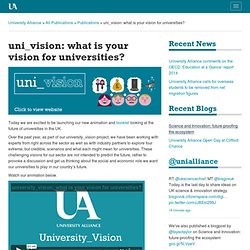
Today we are excited to be launching our new animation and booklet looking at the future of universities in the UK. Over the past year, as part of our university_vision project, we have been working with experts from right across the sector as well as with industry partners to explore four extreme, but credible, scenarios and what each might mean for universities. These challenging visions for our sector are not intended to predict the future, rather to provoke a discussion and get us thinking about the social and economic role we want our universities to play in our country’s future.
Watch our animation below. UA_university_visionFINAL.pdf. www.unialliance.ac.uk/universityvision/files/2012/11/UA_university_visionFINAL.pdf. University_vision: what is your vision for universities? Animated future for UK universities. You might think higher education mission groups only get animated when they are scoring points at each other's expense.
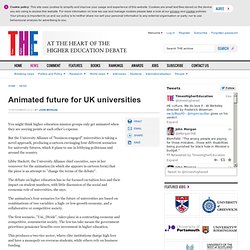
What will universities of the future be like? 9 October 2010Last updated at 02:59 By Hannah Richardson BBC News education reporter From library to smart phone - is this the direction universities will travel?
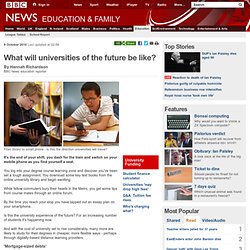
It's the end of your shift, you dash for the train and switch on your mobile phone as you find yourself a seat. You log into your degree course learning zone and discover you've been set a tough assignment. You download some key text books from the online university library and begin swotting. While fellow commuters bury their heads in the Metro, you get some tips from course mates through an online forum. By the time you reach your stop you have tapped out an essay plan on your smartphone. Universities look into the future. The current funding crisis will transform Britain's universities by 2020.
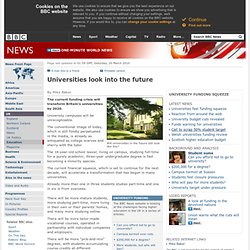
University campuses will be unrecognisable. The conventional image of today, which is still fondly perpetuated in the media, is already as antiquated as college scarves and sherry with the tutor. The 18-year-old school leaver, living on campus, studying full-time for a purely academic, three-year undergraduate degree is fast becoming a minority species. The current financial squeeze, which is set to continue for the next decade, will accelerate a transformation that has begun in many universities. Already more than one in three students studies part-time and one in six is from overseas.
There will be more mature students, more studying part-time, more living in their own or their parents' homes, and many more studying online. There will be more tailor-made vocational courses, operated in partnership with individual companies and employers. Pearson - Blue Skies — New thinking about the future of higher education. www.universitiesuk.ac.uk/highereducation/Documents/2012/FuturesForHigherEducation.pdf. Critical-path-securing-future-higher-education_June2013_10847.pdf. University of the future - EY - Australia. The future of higher education? Five experts give their predictions.
Ahead of the Jisc Digital Festival next week, for which Times Higher Education is media partner, five experts predict the innovations and trends that are set to change the face of higher education and research in the coming years Augmented reality, sensor technology and crowdsourcing are among the technologies that our panel forecast could revolutionise how the sector operates.
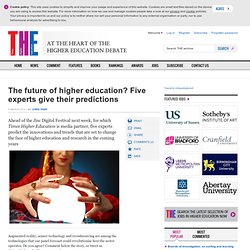
Do you agree? Comment below the story, or tweet us @timeshighered with your suggestions. Expert: Matthew Ramirez, lead augmented reality developer and project manager for Mimas, a centre of excellence that develops technology to make information more accessible, based at the University of Manchester “Augmented reality (AR) is likely to have a big impact on higher education and the entire student cohort, especially when it comes to inter-professional education (IPE). “With AR, it is possible for students to access 3D objects, supporting media and overlaid virtual imagery, reinforcing these practical skills. The future of universities: The digital degree. FROM Oxford’s quads to Harvard Yard and many a steel and glass palace of higher education in between, exams are giving way to holidays.
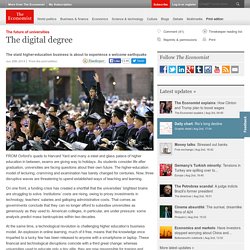
As students consider life after graduation, universities are facing questions about their own future. The higher-education model of lecturing, cramming and examination has barely changed for centuries. Now, three disruptive waves are threatening to upend established ways of teaching and learning. On one front, a funding crisis has created a shortfall that the universities’ brightest brains are struggling to solve. Institutions’ costs are rising, owing to pricey investments in technology, teachers’ salaries and galloping administrative costs.
At the same time, a technological revolution is challenging higher education’s business model. Finance 101 Universities have passed most of their rising costs on to students. For a long time the debt seemed worth it. Small private colleges are now struggling to balance their books. iPad illuminatio mea. 36758932.pdf. Scenarios of the Future of Higher Education. Why Higher Education Needs Scenarios. From sources of funding to student engagement models, from the use of mobile technology to social media, multiple disruptive forces create surprises for administrators, frustrations for academics and bewilderment for students.

Uncertainty threatens to incapacitate institutions as they choose for change to be thrust upon them, or attempt to avoid or ignore the strategic importance of the changes taking place around them. Institutions of higher education tend to plan in a very linear way, driven by accreditation processes better prepared to test an organization’s historical ability to deliver value, than their future ability to compete and remain relevant. Organizations wanting to remain relevant need not only to encourage strategic thinking that positions them in a competitive framework, but they also need to apply scenario planning to grapple with the multiple uncertainties that often force them to adapt rapidly to the changing world around them.
Swiss Statistics - 2011-2020 university scenarios – teaching staff: main results. Higher Education Scenarios. We are in a period where uncertainty is great and historical trends may shift.
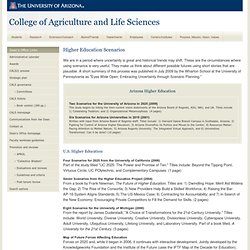
These are the circumstances where using scenarios is very useful. They make us think about different possible futures using short stories that are plausible. A short summary of this process was published in July 2009 by the Wharton School at the University of Pennsylvania as "Eyes Wide Open: Embracing Uncertainty through Scenario Planning. " U.S. Con_future.pdf. Symposium Journals.
5 Bold Predictions For The Future Of Higher Education. The future of higher education is a constantly moving target.
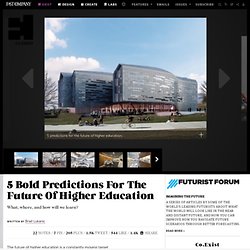
Everything from the emergence of MOOCs to new learning styles and mounting financial and sustainability pressures are impacting the education landscape. Every day higher education leaders are developing new strategies to leverage across these developing challenges and opportunities. Four_future_scenarios_for_higher_education.pdf. Building scenarios for the University. Bert Enserink, , School of Systems Engineering, Policy Analysis and Management, Delft University of Technology, P.O.
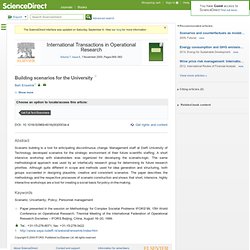
Box 5015, 2600 GA Delft, The Netherlands Received 26 June 1999, Revised 28 February 2000, Accepted 1 April 2000, Available online 20 July 2000 Choose an option to locate/access this article: Get rights and content Abstract Scenario building is a tool for anticipating discontinuous change. Keywords Scenario; Uncertainty; Policy; Personnel management. Universities UK - Policy and analysis - Futures for higher education.
Future of Higher Education News, Research and Analysis - The Conversation. Analysis and Comment (22) Over the past couple of years, massive open online courses (MOOCs) have taken the academic world by storm. Despite much debate about whether the idea of running free online courses for everyone is both… Across the globe, we are experiencing rapid changes to our environment and social structures. Climate change, population growth, and social unrest are causing ever increasing problems. The future of English higher education: two scenarios on the changing landscape - Publication. Professor Jeroen Huisman, University of Bath, UK; Dr Harry de Boer, University of Twente, the Netherlands; Dr Paulo Charles Pimental Botas, University of Bath, UK A Delphi study was carried out, soliciting views from higher education experts on likely and desirable developments in English higher education until 2025. 44 experts participated in the first round of the study and 31 of these also participated in the second.
This paper reports on the most salient findings of the Delphi questionnaire and presents two scenarios. The two scenarios focus largely on the institutional fabric of the higher education system. The first scenario follows the general agreement (relatively speaking) which emerged from the two rounds of the Delphi study. The second scenario is a counter-scenario which intends to present an alternative picture of English higher education in 2025. Thinking Futures – University Scenarios. University ScenariosMaree Conway2010-10-24T09:56:42+00:00 Background The Vice-Chancellor’s desire to use futures approaches in this university’s strategic planning resulted in the development of a scenario planning project, which aimed to provide the context for the review of its top level strategic directions statement.
An earlier limited scenarios project had demonstrated the value of scenarios for the university, and a second, more formal project project was subsequently accepted. ProcessThis project was managed by the university’s planning office, which had been charged with ‘doing foresight’.